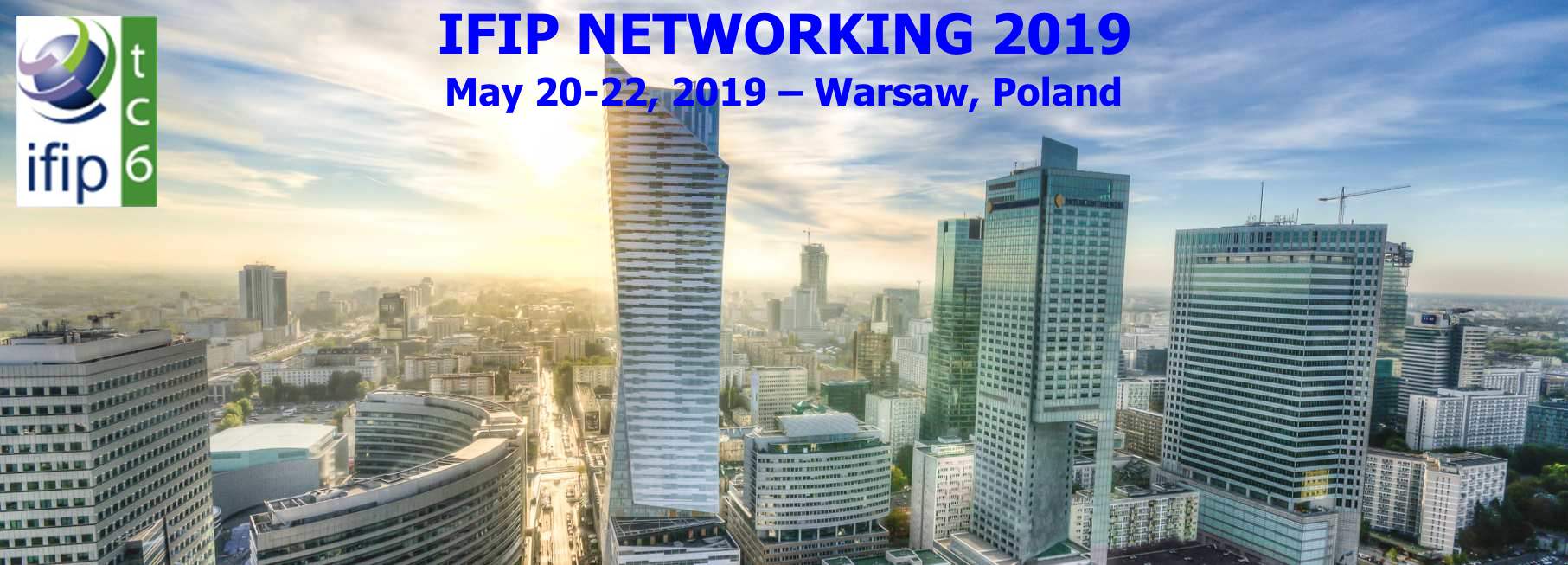Best Paper Award Results
The contest commission has chosen to award two papers:
Best Paper Award - goes to Thomas Fenz, Klaus-Tycho Foerster, Stefan Schmid and Anaïs Villedieu for paper "Efficient Non-Segregated Routing for Reconfigurable Demand-Aware Networks”
2nd Best Paper Award - goes to Viet-Hoang Tran and Olivier Bonaventure for paper "Beyond socket options making the Linux TCP stack truly extensible”.
Student Travel Grant Awards
Best Paper Award
A Best Paper Award will be conferred to the authors based on the quality of the paper and its presentation. The award is given out at the closing ceremony of the conference on May 22.
IFIP Student Travel Grants
Under this programme, only students from an IFIP member country may apply for travel grants. Preference will be given to those who would otherwise not have the resources to attend the conference.
Grants will cover travel and lodging expenses, up to a maximum of 750 € per grant: costs in excess of the grant will not be reimbursed. Please note that the conference registration fee will not be covered by the grant.
Applications for grants will be evaluated by a committee consisting of the TC6 chair and the chairs of the TC6 working groups 6.2, 6.3 and 6.8. Grants will be awarded based on the evaluating committee’s assessment of the applicants’ genuine financial needs, the potential benefit to his/her education, research, and career, and the potential benefit to the conference. The committee may favour those who are (co-)authors of accepted papers to avoid “no shows,” and may decide to make only one award per university.
To apply for a grant, please send the STG Request form jointly a letter to the conference General chair. The student's letter should indicate:
- The academic status of the student
- Whether the applicant is an author of a paper, and whether the paper is accepted or was submitted to the conference
- How s/he would benefit from attending Networking 2019, including which areas in the conference program would impact the student's research
- A brief summary of research interests and accomplishments
- The applied amoun
The supervisor's letter should describe:
- The applicant's academic standing in the institution
- Discuss why and how the applicant would benefit from attending Networking 2019
- Explain why the applicant is in need of the travel grant The application should be sent to This email address is being protected from spambots. You need JavaScript enabled to view it. Applications are due April 15, 2019.
US National Science Foundation (NSF) Travel Grant
Eligibility Criteria
To qualify, a student must be a full-time student at a US institution. Priorities will be given to first-time attendees, especially those who do not have papers accepted by Networking 2019, and to students from under-represented groups (e.g., women, minorities and people with disabilities). Student recipients will be reimbursed (based on valid receipt) after the conference. In order to have their airfare to be reimbursed by this type of STG, students must book their flights from US-based carriers. The final award is contingent upon the receipt showing a proof of registration, by emailing the receipt of registration to the student travel grant chairs.
Award Amount
The award amount will be about $1000-$2000, depending on the number and quality of applications.
Application Deadline: April 19, 5:00PM EST, 2019, April 26, 5:00PM EST, 2019.
Application Procedure
An application for a NSF student travel grant will consist of the following documents, and incomplete applications will not be considered.
- A request letter from the student (see below).
- The student's Curriculum Vitae.
- A recommendation letter from the student's graduate advisor (see below).
The letter from the student should be at most one page, and include the following information:
- Whether the student is a first-time attendee and whether the student has an authored paper being accepted by Networking 2019 and the paper title (if available).
- Whether the student is from any under-represented groups (e.g., women, minorities and people with disabilities).
- A brief summary of research interests and accomplishments to date; students should demonstrate a serious interest in networking, through their coursework and projects.
- A statement about why the conference attendance is important to the student.
- Whether and when the student has received US NSF travel grants before.
- An estimate of the following costs of attending Networking 2019: airfare, hotel, and conference registration. It is anticipated that travel grants will partially cover these overall costs.
The advisor's recommendation letter for the student should include:
- Confirmation that student is a bona fide full-time Ph.D. or M.S. candidate in good academic standing at the given institution.
- The suitability of the Networking 2019 program to the student’s research area.
- Ways this particular student would benefit from attendance at the conference.
- The strengths and potential contributions of the student.
- The advisor’s commitment to covering the student’s travel cost in excess of the travel grant.
Applications should be sent by email to This email address is being protected from spambots. You need JavaScript enabled to view it.
